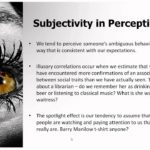Category: Social Psychology
Social Facilitation
Social facilitation is a term coined by American psychologist Floyd Allport in 1924, referring to observations in which people appear to perform better when carrying out a task if others are present, or if others are engaging in the same … Continue reading →
Social Cognition
Social cognition is an area of social psychology in which theories and approaches in cognitive psychology are applied to the study of social behaviour. In this approach, cognitive activity involved in perceiving and responding to the behaviour of others is … Continue reading →
Jigsaw Classroom
The jigsaw classroom is a group learning format, created by American social psychologist Elliot Aronson. Rather than compete against each other, students are encouraged to cooperate in the learning process. A structure is created where small groups of students are … Continue reading →
Sociometer Theory
Sociometer theory is a theory put forward by Mark Leary in 1999, proposing that humans have evolved a form of psychological meter, or gauge, which monitors the degree to which other people value and accept them. Leary named this monitor … Continue reading →
Projective Identification
Projective identification is a psychological term first introduced by the British psychoanalist Melanie Klein, to describe the psychological process by which a person projects a thought or belief that they have onto a second person. The concept of projective identification … Continue reading →
Person Perception
Person perception refers to the impressions people form about the people around them, using subjective processes such as the effects of physical appearance, social schemas, stereotypes, illusory correlations, the spotlight effect and discrimination (in-groups/out-groups). See more social psychology concepts.
Attitudes
In a very basic sense, an attitude can be defined as someone’s positive or negative evaluation of people, objects, events, activities, or ideas. An attitude can be said to be pervasive, but also changeable. Attitudes have been a central concept … Continue reading →
Interpersonal Attraction
Interpersonal attraction can be defined as forces acting between two people which bring them together to form friendships and other types of relationships. Interpersonal attraction is thought of in terms of how much one likes, dislikes, or hates another person. … Continue reading →
Solomon Asch Conformity Experiments
The Solomon Asch conformity experiments were a set of experiments performed in the 1950’s by the American psychologist, Solomon Eliot Asch, in which it was demonstrated that an individual’s opinions could and would be influenced by those making up the … Continue reading →
Aggression
Aggression is any act of violence intended to harm others. Related lecture: The Psychology of Violent Behaviour, Dr. Kevin Douglas








